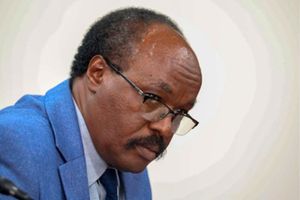
Education Cabinet Secretary Migos Ogamba when he appeared before the National Assembly Committee on Health at Parliament Buildings Nairobi on Thursday, April 24, 2025.
More than 400,000 students or 60 per cent of the total enrollment in public universities are studying in institutions that are poorly governed, a parliamentary committee heard.
Education Cabinet Secretary Migos Ogamba told the National Assembly’s Public Investments Committee on Governance and Education that 21 out of the 43 universities in Kenya are non-performing in terms of management.
He attributed the failure to political patronage and ethnic considerations during the appointment of the Vice Chancellors and Council Members in the institutions of higher learning.
Mr Ogamba told the National Assembly’s Public Investments Committee on Governance and Education chaired by Bumula MP Wanami Wamboka that 20 universities are doing well while 21 are doing badly because of governance issues and political patronage.
“The 21 non-performing universities have more than 60 per cent or 400,000 out of the more than the total enrollment 800,000 students,” Mr Ogamba said.
“If we were to kill these 21 universities as suggested by the member for Imenti Central (Moses Kirima), what would we do with the students in the universities?” Mr Ogamba asked
Mr Kirima had demanded that the loss-making universities be closed and students re-distributed to other well performing institutions.
Mr Ogamba told the committee chaired by Mr Wamboka on Friday, April 25, 2025, that the Ministry has embarked on ensuring that applicants for appointment to councils will henceforth undergo security background checks by authorities to determine their suitability.
Mr Ogamba said the Ministry is reviewing the qualification of all University Councils with a view of ensuring that all members are qualified to run the higher education facilities.
“Out of the 43 Universities, 21 are struggling. We have not appointed Council Members for a number of universities because we want to ensure they are qualified. We are now doing background checks on who will be hired to be members of the councils.”
“University Council members must undergo background checks before they are hired. We are now scrutinising six councils. It is important that the committee notes that 21 out of the 43 universities councils have problems.”
Mr Ogamba appeared before the committee to respond to cross cutting issues relating to audit of public universities and the Technical Vocational Education Training (TVET) on the non-remittance of statutory deductions, operation without Governing Councils, stalled projects, rejection of Vice-Chancellors on resumption of leave, ethnic and gender balance in staffing and appointments and officers in acting positions for over six months,
Auditor General Nancy Gathungu had questioned the failure by a number of Universities operating without Governing Council as well as ethnic and gender balance in staffing and appointments.
The Cabinet Secretary told MPs that the slow process of appointing vice chancellors and councils has been necessitated by the need to ensure that qualified persons are appointed to the vacant positions.
“The problems in our institutions of higher learning has been occasioned by political patronage or governance issues. We are now taking time to do background checks to know who runs our institutions of higher learning,” Mr Ogamba said.
“In appointing university council’s and board of TVETs institutions, we strive to abide by the stipulation of the Constitution on fairness, regional and gender balance, merit and competition,”
Mr Ogamba told MPs that the councils and board play strategic oversight roles in the management of institutions which are responsible for policy formulation, strategic direction, financial oversight and institutional accountability.
“It is therefore important to get the right people, with the right skills-mix and in a manner that is faithful to the law,” Mr Ogamba said.
“As we speak, most of our university councils are fully constituted. Only six public universities have vacancies of between two and three members. The others are fully constituted or lack just one member,” he said.
“The vacancies have not been filled yet because of the recruitment process that we are undertaking to secure the right skills-mix, gender and ethnic balance. We will fill these vacancies once the ongoing recruitment process is complete.”
He said once the Public Service Commission (PSC) completes recruitment processes, it will be submitted to the university councils which then consults with the Cabinet Secretary before appointments are made.
Mr Ogamba said the key consultations other than merit, include gender and regional balance in ensuring that senior management appointments reflect the face of Kenya and gender inclusivity.








